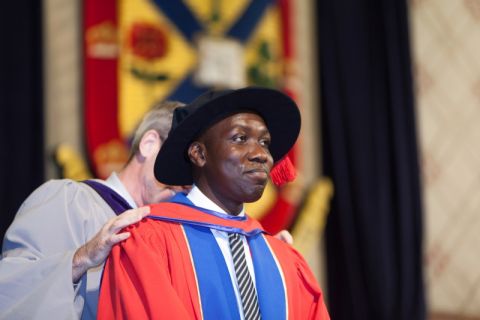
Since receiving his doctorate, Oluwatobiloba (Tobi) Moody, PhD’16, has advised Canada’s federal and provincial governments on key intellectual property policy initiatives, and has overseen the establishment of the World Intellectual Property Organization’s first Sub-Saharan African External Office in Nigeria. This fall, he will return to his alma mater as the Queen’s National Scholar in International Economic Law.
“My scholarship experience as a doctoral student at Queen’s Law was phenomenal,” says Moody. “An opportunity to contribute to the training of a next generation of lawyers at Queen’s Law, while still conducting important research in the area of international economic law, was a special attraction underlying my application.”
Moody, who holds an LLB from the University of Ibadan in Nigeria and an LLM from the University of the Western Cape in Cape Town, South Africa, received a $150,000 Vanier Canada Graduate Scholarship for his doctoral studies at Queen’s. He wrote his thesis on
“WIPO and the Reinforcement of the Nagoya Protocol.”
Specializing in international intellectual property law, he has a particular focus on the protection of “traditional knowledge” held by Indigenous and other societies. His work intersects with other areas of international economic law, in particular international trade law and international human rights law.
Moody’s most recent publications include a chapter on “Trade-Related Aspects of Traditional Knowledge Protection” in the volume, Indigenous Peoples and International Trade: Building an Equitable and Inclusive International Trade and Investment Agreement (Cambridge University Press, 2020, eds. Risa Schwartz and John Borrows); and a featured article, “Climate Action and Sustainability: Indigenous Peoples are Part of the Solution,” in the WIPO Magazine (January 2020).
As a post-doctoral fellow with the Centre for International Governance Innovation (CIGI) in Waterloo from 2017-2019, he collaborated with Canadian and multilateral institutions and researchers to shape CIGI’s work in traditional knowledge governance.
Next, he returned to the WIPO – the organization with which he had served as a staff member from 2012 to 2014 and then as a consultant since 2016 – to establish the WIPO Nigeria Office (the organization’s external office in that country), as well as take on the role of its Counsellor/Acting Head, interfacing with key IP institutions and stakeholders to promote awareness, training, and capacity-building in the field of IP and across WIPO’s global services in Nigeria.
He will soon be bringing his wealth of experience to students at Queen’s Law, where he chose to complete his PhD for three main reasons. “First, I was attracted by the reputation and prestige of the university and the law school. This extended to the strength of the faculty members, who are leading experts in their fields,” he says. “Second, I loved the small and intimate nature of the graduate program, which I considered important for a deeper connection with the faculty, and greater personalized support for my research. Third, I was drawn by the prospect of living in the historic and beautiful city of Kingston.”
When he begins his academic appointment, Tobi Moody will be enjoying all that again as he contributes to the school’s research footprint and shares his specialized knowledge with students.
Dean Mark Walters says that he is “absolutely delighted” that Tobi will join the faculty. “Tobi will add intellectual depth and experience to an international law group at Queen’s, which is probably the strongest in the country. He will also bring an infectious enthusiasm for teaching and learning. We are very fortunate.”